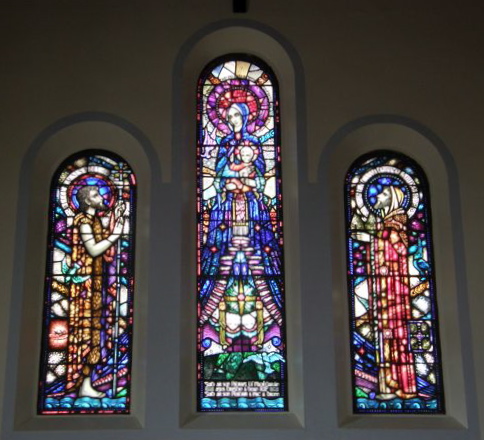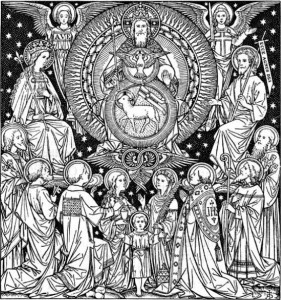====================
This sermon was preached on the Second Sunday after Pentecost, June 2, 2013, at St. Paul’s Episcopal Church, Medina, Ohio, where Fr. Funston is rector.
(Revised Common Lectionary, Pentecost 2 (Proper 4, Year C): 1 Kings 18:20-39, Psalm 96, Galatians 1:1-12, and Luke 7:1-10. These lessons can be read at The Lectionary Page.)
====================
 Ten years ago yesterday, June 1, 2003, I became Rector of St. Paul’s Episcopal Church of Medina, Ohio, Inc. We didn’t celebrate that “new ministry” until sometime in October because of difficulties scheduling bishops and other dignitaries, but on Sunday, June 1, 2003, I presided at the Holy Eucharist for the first time in this space.
Ten years ago yesterday, June 1, 2003, I became Rector of St. Paul’s Episcopal Church of Medina, Ohio, Inc. We didn’t celebrate that “new ministry” until sometime in October because of difficulties scheduling bishops and other dignitaries, but on Sunday, June 1, 2003, I presided at the Holy Eucharist for the first time in this space.
It was different then. One of the things we’ve done in the past ten years is remodel this space (thanks to a gift from Verna Bruckmann in memory of her late husband Jack whom many of us remember with affection). We’ve also upgraded the parish library, refurbished the dining room, and improved the parish hall (thanks to the good fund-raising efforts of the Episcopal Church Women). We’ve purchased additional real estate, torn down the derelict houses that were on it, incorporated those lots into our landscaping, and replanted nearly all of the decorative gardens, mostly with volunteer labor.
But more important than the building and the grounds are the ministries through which we have touched peoples’ lives. In these ten years, there have been more than 1,500 celebrations of the Holy Eucharist in this sanctuary! That means just here, in this space, there have been more than 250,000 administrations of Holy Communion; more than a quarter of a million times communicants have received the Blessed Sacrament, this sacrament which (as one of our prayers of thanksgiving says) is “the pledge of our redemption” through which the grace of God brings us “forgiveness of our sins, strength in our weakness, and everlasting salvation.”
During these ten years, since we started the Brown Bag Concerts in 2007, there have been more than seventy free concerts and recitals in this space, which means something on the order of 4,000 concert-goers have received the gift music which (the poet Berthold Auerbach said) “washes away from the soul the dust of everyday life.”
There have been more than seventy baptisms, more than forty-five weddings, and more funerals than I care to remember. Each summer up to fifty children have come into this worship space to sing songs, act in skits, and learn the stories of the faith at our annual Vacation Bible Schools.
And downstairs, twice month, 220 times in these ten years, the Free Farmers’ Market has opened its doors and provided sustenance to those unable to afford it in the stores. I suppose a statistician or an economist would invent some measure for what has been distributed like a “family-week of groceries” — we’ve distributed something like 16,000 or more “family-weeks” of food and other items to hundreds of needy households. All told, nearly a half-million pounds, 250 tons, of food have been given away by this parish.
And that’s just a small sample of the statistics we could boast. There have been home visits, picnics, hospital communions, confirmations, study groups, foyer groups, potluck suppers, and so much more.
It’s been a good ten years. So . . . Happy Anniversary!
I’ll come back to consideration of our decade together, but for now, let’s take a look at the lessons for today.
What we have in our three selections from Scripture this morning are stories of authority, but more than that, they are stories of authenticity. Let’s take a look at each one in turn.
First, we have the story of a competition between Elijah, a prophet of Yahweh, the God of Israel, and the priests and prophets of Ba’al, who was the god (or perhaps the pantheon of gods) of the Phoenicians. Elijah was a well-known prophet. We know that he was known in Syria and in Egypt and in other places because the Bible tells us this, that he was known as “the man of God.” Not simply as “a man of God” but as “the man of God.” He was well known as a prophet, but he was not well known as a pleasant fellow – I’ll get to that in a moment.
In our story today, “the man of God” is dealing with a competing religion. Ba’al worship had been brought to Israel when King Ahab married a woman whose name is familiar to all of us, Jezebel, the daughter of Ethbaal, King of Tyre. The marriage of their king to this Phoenician princess and his allowing her to set up temples and practices of her native religion in Shechem, the capital of the northern kingdom, caused a problem for the people of Israel. Should they continue in their old religion (represented by Elijah) or in this new religion followed by their queen and, eventually under her influence, their king? Being politically astute, they did the logical thing – a little bit of both. And this is where we enter the story in today’s reading from the First Book of Kings.
An assembly is called and Elijah says to everyone, “How long will you go limping with two different opinions? If the Lord is God, follow him; but if Ba’al, then follow him.” Nobody says a word . . . . So Elijah proposes a contest. “Let’s do this,” he says, “well set up two altars and put a bull carcass on each one. The priests of Ba’al will call on their god to consume his bull with fire and I’ll call on my god to consume his bull with fire, and the one that actually does it will be acknowledged as the god to be worshiped in this country.”
I love the way the New Revised Standard translation gives the people’s response: “Well spoken!” they say. It’s like he was just giving a speech – the Gettysburg Address or something. The actual Hebrew is “good utterance.” The American Standard translation renders it better as, “That is a good idea!” Everybody loves a sporting event; everybody loves a good contest! Good idea!
So they do it. The priests and prophets of Ba’al set up their altar and do their best. They chant and dance and even cut themselves in an attempt to get their god’s attention, but nothing. Then it’s Elijah’s turn. But before he prays, he tells those present to make it really hard to burn up the altar and the bull sacrifice – “Douse it with water,” he says, “douse it good.” Three times they flood it, until water is running everywhere and the whole place is a muddy mess.
That’s when he says, basically, “OK, God, do it!” And God does it – a lightning bolt or a pillar of fire or something – and all the wood, the water, the bull, the whole shebang is burnt up!
But this is where our lectionary gives us a false impression of the story. Our “official” reading cuts off a verse before the story actually ends. We are left hearing that all the people “fell on their faces and said, ‘The Lord indeed is God; the Lord indeed is God.'” It sounds like everybody, including the followers of Ba’al, agreed Yahweh was the real deal and lived happily ever after. Not so . . . .
The next verse:
Elijah said to them, “Seize the prophets of Baal; do not let one of them escape.” Then they seized them; and Elijah brought them down to the Wadi Kishon, and killed them there. (1 Kings 18:40)
You see, Elijah was not a particularly pleasant person. We know this from the story of Elijah cleansing the Syrian leper, the general Naaman; he wouldn’t even bother to talk to Naaman, just sent him a message to bathe in the Jordan. That really annoyed Naaman. And we see it in spades here. Elijah had won this battle. God was proven to be the true God and Ba’al was shown to be powerless. But Elijah can’t just leave it there; he has to drive the point home by slaughtering those who had served the false god. This really annoys Queen Jezebel who will send her army to find and kill Elijah. You all know the story of Elijah hiding in the cave and living through a storm, a mighty wind, and an earthquake, but finally hearing the voice of God in the silence. This little competition with and killing of the prophets of Ba’al is why he was hiding.
So this is a story of authority – the authority of Yahweh as the true god and the authority of Elijah as his prophet – but it is also a story of authenticity. Elijah made no bones about who and what he was; he was not a pleasant fellow. And everyone knew it. Nonetheless, they clearly respected him. Despite his unpleasantness, this defect in his character, they respected his role and office as a prophet of the living God. And God empowered him as and who he was.
So . . . second reading — the introduction to Paul’s Letter to the Galatians. Reading one of Paul’s letters it is always best to remember that almost all of them were written to solve problems.
Paul’s method of evangelism was to ride into town, spend time getting to know the people, gather a group of folks interested in the story of Jesus, share the gospel with them and instruct them, identify the leaders in the group, empower those leaders (ordain them, if you will) to carry on and minister within the community, and then move on to some new town and start the process all over again. What would happen then is that the community would have some problem and someone would contact Paul – “Dear Paul, you aren’t going to believe what is going on . . .” – and he would write a letter giving his advice on how to deal with it.
This is what has happened in Galatia. After Paul left, two other groups of Christian missionaries showed up and tried to convince the Galatians that Paul had been wrong. The first group were the Gnostics. The Gnostics had been around since before Jesus, but they’d sort of adopted Jesus as one of their own; some who were exposed to the Gnostic teachings found in Jesus the sort of teacher they’d had before. Gnosticism gets its name from the Greek word for “knowledge” and their approach to religion and spirituality was based on the idea that through special knowledge one could escape the evil of the material world. They thought that the material world was bad and that salvation was achieved by leaving it behind, and the only way to leave it behind was through initiation into this special or secret knowledge. Christian Gnostics taught that Jesus had given the secret knowledge to the Twelve and they had then passed it on to a few special leaders who passed it on to chosen initiates, and so forth. To them, Paul’s response was, “No way! The Gospel is open and transparent. It’s for everyone!”
The second set of folks who were causing the Galatians problems were Jewish Christians who taught that before you could be a Christian you had to be a Jew. We call them “the Judaizers.” They were teaching that a Gentile had to first convert to Jewish law and practice. Gentiles had to “keep kosher” (as we would currently say), then they could be baptized and be followers of Jesus’ Way. For example, they taught that adult males had to be circumcised. (I think it may have been one of those adult males who wrote to Paul – “You aren’t going to believe what these people are saying!”)
Paul’s response to the Judaizers was also a big “No way!” What he wrote to the Galatians was that Jesus and Jesus’ good news redeems them where and as they are. They do not need to become something else, something different. Rather, they need to be authentically themselves. It is as their authentic selves that Jesus redeems them and empowers them to be better Gentiles; they don’t have to become Jews.
Again, it is a story of authenticity and of God’s respect for people as and who they are.
Which brings us to the gospel lesson from Luke, a healing story told in both Matthew’s and Luke’s Gospels, but in Luke’s version it is unlike any other in all of the Gospels. In no other healing story does Jesus never talk to the person making the request, nor address the person being healed, nor even see (let alone touch) the person being healed, but that is exactly what happens here according to Luke. As Jesus arrives in Capernaum, some Jewish elders come to him and tell him about this Roman Centurion who has been very good to their community. Apparently there is someone in his household who is very important to him and this person is gravely ill. The Greek is unclear — the word used is pais which could mean “son” or “servant” or “slave” or, even possibly, “beloved” — but what is clear is that the Centurion would like this person healed.
Jesus is convinced by the elders to do so and sets off for the Centurion’s house. Before he gets there, however, the Roman sends messengers saying, “You don’t need to come. I’m unworthy to have you to enter my home. Just say the word and my son/servant/beloved will be healed.” Perhaps the Centurion knows of the Jewish custom forbidding an observant Jew from entering a Gentile home. In any event, his messengers convey his explanation: “Like you, Jesus, I am a man under authority. I answer to those above me, and I expect and get obedience from those below me.” He is saying that he recognizes that Jesus is under the authority of Heaven, and that as such he can expect and get the obedience of the powers of the world. Just say the word; it will be done.
In response to this message, Jesus praises the Roman’s faith: “Not even in Israel have I found such faith,” he tells the crowd. The word here translated as “faith” is pistis, the root of which is peitho which names the quality of having trust, or of being trusted, or trusthworthy, and confident. So while this, too, appears to be a story about authority it is, at its heart, a story about authenticity. This Roman was being true to who he was; not a Jew, he felt unable to appeal directly to Jesus or to have Jesus enter his home. Nonetheless, he had the confidence that Jesus would honor him and heal his son/slave/beloved. And Jesus does so. Jesus honors his honesty and authenticity.
Which brings me back to our 10th anniversary . . . .
Ten years and a few months ago we, this parish of St. Paul’s Episcopal Church of Medina, Ohio, and I began the courtship which is the way we Episcopalians pick and choose our clergy leadership. This parish, as any parish in search of a rector would do, did a self study and prepared a parish profile which was then entered in to our denominational dating computer in New York City. As a priest seeking a new call, I had done a personal profile and had it in entered into that same ecclesiastical “match-dot-com” system. The dating computer ran its algorithms and matched us up, and you all selected me as one of the priests to contact, so we started our conversations.
Now you all know that Evelyn and I are originally from Nevada, so while this was going on, she was praying that we would end up somewhere (as she put it) “western.” She didn’t disallow my consideration of a parish in Ohio, but she wasn’t really all that thrilled about it. One of the things that had attracted me to St. Paul’s Parish was your written profile, this booklet that parishes write and publish with pictures and financial reports and so forth, describing themselves, their town, the ministries they do, etc. etc. etc. Most of the time these profiles are not really very accurate; instead of being a description of the parish as it is, they describe what the congregation wants to be — they are “wish lists.” Sometimes, even worse, they are simply “what someone in the diocesan office told us we had to say if we wanted to get a priest.” St. Paul’s Parish Profile was different. It seemed to be honest and authentic. It told a story of a lot of good stuff, but it also admitted to some not very positive, not very inviting aspects of the church, as well. I remember one line, in particular, in the closing paragraphs of the booklet: “This is who we are . . . warts and all.” (I now have some suspicion about who probably wrote that line!)
At the same time, I tried to be honest and up-front with you, as well. While Evie was praying that I would get a call to someplace “western,” I kept telling her not to worry; each time I would answer one of your search committee’s requests for more information about me, or for a copy of a sermon, or for my position on some controversial issue, I would say to her, “Well, after they get this, they won’t be calling me.”
And then there was the face-to-face interview, the visit when we got to know one another. You told me what you were looking for in the future, what you hoped to be, what your problems as a church community were. I told you what my strengths and skills in ministry were and are; I told you what I didn’t (and still don’t) do well. Let’s face it — there are some things I’m pretty good at . . . and there are some things I’m really quite bad at! And after our last, extremely honest conversation, as we sat waiting to board the plane back to Kansas, I said to Evelyn one more time, “Well, after this, they won’t be calling me.” But you did.
I tell Evie that she got exactly what she prayed for! Where did we end up? In the “Western Reserve”! (I tell her now that she has to be more specific in her requests of God.)
Throughout our so-far-ten-year relationship we’ve stayed honest and up-front and authentic with one another. I think that’s how we’ve been able to accomplish the things we’ve done. And let’s be very honest about that — all of those statistics, the hundreds of worship services, the thousands of communions, the dozens of concerts, the tons of food distributed, I can’t take responsibility for those. I believe we have been able to do all of that because we have been authentic; I believe that God blesses those who are authentic, open, honest, and up-front with themselves, with one another, with the world around them, and with God. Just as Yahweh answered Elijah’s prayer, just as Jesus blessed the Centurion and healed his son/slave/beloved, God has answered our prayers and blessed our ministries.
I didn’t do those things. You did them. We did them together. About the only thing I can lay entirely at my own feet, the only statistic that I can take full responsibility for over the past ten years, is that I have gained about 70 pounds! I’m not happy about that, and I intend to change that.
But we together have done a lot, and I believe we have a lot more to do, and I believe that we will accomplish it together – openly, honestly, and authentically. It’s been a great ten years! Let’s have ten more! Amen.
====================
A request to my readers: I’m trying to build the readership of this blog and I’d very much appreciate your help in doing so. If you find something here that is of value, please share it with others. If you are on Facebook, “like” the posts on your page so others can see them. If you are following me on Twitter, please “retweet” the notices of these meditations. If you have a blog of your own, please include mine in your links (a favor I will gladly reciprocate). Many thanks!
====================
Father Funston is the rector of St. Paul’s Episcopal Church, Medina, Ohio.
 In the Psalter in the Episcopal Church Book of Common Prayer this verse (numbered “7” there) is rendered: “In sacrifice and offering you take no pleasure (you have given me ears to hear you).” I rather prefer the NRSV’s translation because the “open ear” can hear more than God, and that open-eared hearing of others is much on my mind this morning.
In the Psalter in the Episcopal Church Book of Common Prayer this verse (numbered “7” there) is rendered: “In sacrifice and offering you take no pleasure (you have given me ears to hear you).” I rather prefer the NRSV’s translation because the “open ear” can hear more than God, and that open-eared hearing of others is much on my mind this morning. Ten years ago yesterday, June 1, 2003, I became Rector of St. Paul’s Episcopal Church of Medina, Ohio, Inc. We didn’t celebrate that “new ministry” until sometime in October because of difficulties scheduling bishops and other dignitaries, but on Sunday, June 1, 2003, I presided at the Holy Eucharist for the first time in this space.
Ten years ago yesterday, June 1, 2003, I became Rector of St. Paul’s Episcopal Church of Medina, Ohio, Inc. We didn’t celebrate that “new ministry” until sometime in October because of difficulties scheduling bishops and other dignitaries, but on Sunday, June 1, 2003, I presided at the Holy Eucharist for the first time in this space.  Confession: I have never followed any path exactly as it was laid out by anyone . . . even, I’m sure, God. Ever. Could that be why I’ve never lived long in any one place? The longest I ever lived in any place was in an exurban area of Kansas City on the Kansas side of the state line in a house I hated. (It was a split-level; I don’t like split-level homes.) Maybe not following the straight-and-narrow is why I’ve been something of a vagabond; the two do seem to go hand-in-hand.
Confession: I have never followed any path exactly as it was laid out by anyone . . . even, I’m sure, God. Ever. Could that be why I’ve never lived long in any one place? The longest I ever lived in any place was in an exurban area of Kansas City on the Kansas side of the state line in a house I hated. (It was a split-level; I don’t like split-level homes.) Maybe not following the straight-and-narrow is why I’ve been something of a vagabond; the two do seem to go hand-in-hand.
 The 16th chapter of Luke’s Gospel keeps pulling me up short with these weird little “What did Jesus mean by that” moments. There’s that “dishonest wealth” comment and now this one about entering the kingdom of God by force . . . .
The 16th chapter of Luke’s Gospel keeps pulling me up short with these weird little “What did Jesus mean by that” moments. There’s that “dishonest wealth” comment and now this one about entering the kingdom of God by force . . . . 
 In August of last year the
In August of last year the  Wow! Jesus says some really tough stuff occasionally, and this one ranks really near the top. In my opinion, this is just slightly below the cut-off-your-hand and pluck-your-eye out stuff in terms of toughness.
Wow! Jesus says some really tough stuff occasionally, and this one ranks really near the top. In my opinion, this is just slightly below the cut-off-your-hand and pluck-your-eye out stuff in terms of toughness. A few days ago an ordained colleague posted this status to Facebook:
A few days ago an ordained colleague posted this status to Facebook:
 It’s Good Shepherd Sunday . . . the Fourth Sunday of the Easter Season is always Good Shepherd Sunday. Every year, regardless of which of the three years of the Lectionary cycle we are in, we hear some lessons which mention shepherds or lambs, and we recite the 23rd Psalm as the Gradual, and we sing every “Shepherd hymn” in the hymnal. I’ve been preaching Good Shepherd sermons for 25 years, so I pretty much thought this was going to be one of those Sundays when I could just “wing it” and preach extemporaneously.
It’s Good Shepherd Sunday . . . the Fourth Sunday of the Easter Season is always Good Shepherd Sunday. Every year, regardless of which of the three years of the Lectionary cycle we are in, we hear some lessons which mention shepherds or lambs, and we recite the 23rd Psalm as the Gradual, and we sing every “Shepherd hymn” in the hymnal. I’ve been preaching Good Shepherd sermons for 25 years, so I pretty much thought this was going to be one of those Sundays when I could just “wing it” and preach extemporaneously.  In the 1989 movie Romero starring Raul Julia as the martyred Archbishop of El Salvador, there is a scene in which Father Manuel Morantes (played by actor Tony Plana) paraphrases these words of the elder John: “How can we love God, whom we have not seen, if we do not love our brothers and sisters whom we do see?” It is clear from the setting that what Father Morantes means by “love” is not merely romantic emotion; it is not starry-eyed sentimentalism; it is not impractical idealism. What Father Morantes means, and what I believe the elder means in this letter, is hard and gritty, down-to-earth, hands-on, practical caring about and caring for others.
In the 1989 movie Romero starring Raul Julia as the martyred Archbishop of El Salvador, there is a scene in which Father Manuel Morantes (played by actor Tony Plana) paraphrases these words of the elder John: “How can we love God, whom we have not seen, if we do not love our brothers and sisters whom we do see?” It is clear from the setting that what Father Morantes means by “love” is not merely romantic emotion; it is not starry-eyed sentimentalism; it is not impractical idealism. What Father Morantes means, and what I believe the elder means in this letter, is hard and gritty, down-to-earth, hands-on, practical caring about and caring for others.

